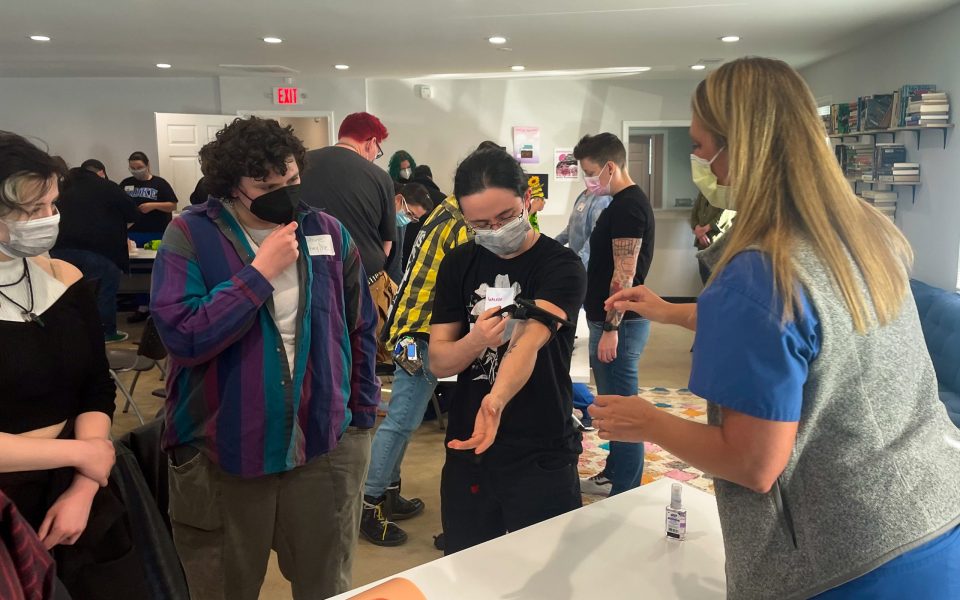This story was originally published by UNC Media Hub. Story by Kyle Ingram.
Drag performers across the state are taking their safety into their own hands, eager to protect their community as LGBTQ people face increasing harassment and attacks from far-right groups such as the Proud Boys.
A new group, the Performer Advocacy Coalition, is teaching entertainers and allies CPR, first aid and self-defense in case the worst happens during a show.
“We need to protect ourselves, no one is going to save us,” Rose Lintner, one of the group’s founders, said.
Lintner, a Raleigh drag performer, had originally intended the Performer Advocacy Council to be a labor rights group to address pay and gender equity issues in the performance industry. But in the wake of the Club Q shooting, which left five dead and 25 injured at an LGBTQ nightclub in Colorado, the group’s mission shifted.
“It doesn’t really matter what we’re getting paid if we’re dead,” Lintner said.
Last month, the group held its first safety training in Durham: a class on how to stop fatal bleeding. The Duke Trauma Center provides free “Stop the Bleed” classes to businesses, churches and community organizations across the Triangle, but this was its first time providing a class specifically for the LGBTQ community.
“I’m ashamed that there’s a need for this type of program for this group,” Tricia Smar, a nurse with Duke Trauma Center, said at the training. “I’m sorry that this is a trauma that you all are dealing with as a community, and I’m hopeful that this will give you at least some tools to feel empowered in those types of spaces.”

Throughout the 90-minute course, Duke nurses instructed attendees on the best way to stop bleeding in a crisis situation, allowing them to practice a variety of methods on fake limbs. They stressed that blood loss is the No. 1 cause of preventable death — one that even people with little medical training can help avoid.
Georgina Durst, Duke Trauma’s program manager, said the training has saved lives since it began in 2016.
“It’s one of the best things I’ve done,” Durst said. “You feel like you’re teaching someone something that could actually make a difference.”
Dagon Pax, a Greenville drag performer, has noticed venues across the state increasing security in response to harassment from far-right groups. Pax hopes the training will allow the community to keep each other safe.
“Having people who know at shows in general is a good idea,” Pax said. “It’s just unfortunate that all of these recent tragedies have made you think about it.”
North Carolina drag shows have faced a string of threats in recent months as state legislatures across the country pass anti-trans laws. In October, Proud Boys harassed attendees of a drag brunch in Sanford after the event was posted on the viral LibsOfTikTok account. The Proud Boys are a white nationalist group that has targeted drag shows across the country, calling performers “pedophiles” and threatening violence.
“I don’t think I know a single performer right now who hasn’t had at least one of their shows threatened, if not canceled, due to Proud Boy harassment in this area,” Lintner said.
In December, organizers of a drag show in Moore County received death threats and harassment leading up to the performance. On the night the show debuted, several power substations in the county were attacked, leaving more than 45,000 homes without power. Authorities have not directly tied the drag show to the attack, but Moore County Sheriff Ronnie Fields told The New York Times, “Anything’s possible.”
Although the circumstances that prompted the class are troubling, Lintner said they were glad to offer a space for LGBTQ people to learn to help one another.
“To see a really good chunk of the community and our allies responding to this, wanting to learn, wanting to have the skills to save lives is so reassuring in a really dark time,” Lintner said.
Join the First Amendment Society, a membership that goes directly to funding TCB‘s newsroom.
We believe that reporting can save the world.
The TCB First Amendment Society recognizes the vital role of a free, unfettered press with a bundling of local experiences designed to build community, and unique engagements with our newsroom that will help you understand, and shape, local journalism’s critical role in uplifting the people in our cities.
All revenue goes directly into the newsroom as reporters’ salaries and freelance commissions.


Leave a Reply